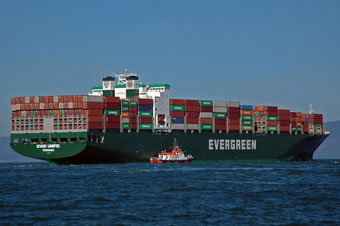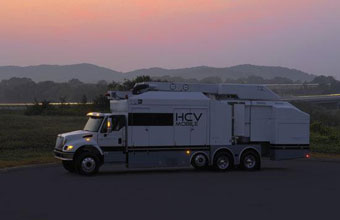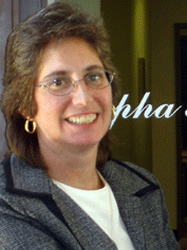Cool Chain Vision
Benefits Everyone
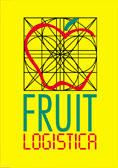 Let’s
face it, 2009 may not be remembered as the year of the great air cargo
trade shows and meetings. Let’s
face it, 2009 may not be remembered as the year of the great air cargo
trade shows and meetings.
But that notion may be only because people
are generally busy working at saving their businesses.
We like Fruit Logistica that takes place
every February in Berlin.
The place is wall-to-wall fresh fruit
and veggies with all the latest techno ideas to get stuff to market
fresh and in one piece as well. Next Fruit
Logistica will be held in Berlin February 3-5, 2010.
IATA Cargo had a great World Cargo Symposium
III in Bangkok this past March and looking ahead, WCS IV to be held
next March in Vancouver promises to be better.
At Munich Air Cargo Europe this past May
the action was busy and big time turnout was also excellent although
in retrospect the meeting sessions seemed inadequate to silly.
In any case ACE takes 2010 off but promises
to return in 2011.
Worth mentioning is that both Fruit Logistica
Asia (that took place last week) and an Asian version of Air Cargo Europe,
Air Cargo China, have met with mixed results—fair to good for
Fruit and not so good (at least among people we talked to) at the last
edition of ACC 2008.
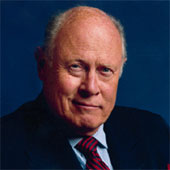 So
that leaves smaller meetings and other local events. So
that leaves smaller meetings and other local events.
One such smaller event with wide industry
impact was the Annual General Meeting of the Cool Chain Association
(CCA) held in Luxembourg this past May 5.
Under the tutelege of the great Robert
Arendal, (left) a founding father of TIACA and an otherwise air cargo
transportation thinker and human being to boot, CCA in these tough times
managed to come up with a remarkable statement/document of what the
organization is thinking and hoping for and doing.
 The
2009 CCA AGM report here is spot on—not only at addressing some
widely important issues confronting air cargo perishables, but also
by bringing to the fore the social responsibility of air cargo to develop
and practice best case scenarios with our great technologies for the
good of everyone. The
2009 CCA AGM report here is spot on—not only at addressing some
widely important issues confronting air cargo perishables, but also
by bringing to the fore the social responsibility of air cargo to develop
and practice best case scenarios with our great technologies for the
good of everyone.
CCA Secretary General Mr. Christian Helms
(right) presented: “Make the World a Better Place”.
“CCA is determined to harmonize
the global movement and handling of perishables and temperature sensitive
products (PTSP) to the benefit of the consumer and the supply chain
participants.
“Therefore, CCA established in 2005
the standard Cool Chain Quality Indicators (CCQI) that cover all logistic
providers handling PTSP.
“The first thought was that improving
the cool chain means less waste and an extended shelf life.
“Less waste means a higher supply
of nutrition to lower costs and better quality and possible improvements
for the world‘s poor.
“By bringing all parts of the cool
chain together to detect possible improvements and to make them achievable
on a global scale, the CCA wants to contribute to making the world a
better place.
“Let’s face it: The world
population has exploded to a total of 6.7 billion today and is estimated
to reach a total of 9.1 billion people by 2050.
“Malnutrition is the largest contributor
to disease in the world.
“In 2007, worldwide 923 million
people (14% of the world population) were undernourished – while
1.3 billion people in the rich world suffer from overweight and obesity.
The number of people in developing countries
living on less than $1 a day was 980 million in 2004.
“Threat of pandemics is growing
due to globalization and quick responses are urgently needed –
everywhere at any time.
“Our industry faces 30% waste from
harvest to the consumer while real food prices rose by 64% between 2002
and 2008.
“Much remains to be done to eradicate
the scandal of malnutrition in the context of a world that has seen
global GDP double in real terms in the past 20 years.
“There is a future need to produce
34% more food as well as fresh water for an increasing population -
and at the same time also eradicate the present poverty of 1.3 billion
people.
“To meet present and future requirements
we have to begin and change!
“The waste in our industry is mainly
due to: Lack of common procedures, lack of training, lack of communication
standards, and lack of measuring criteria for the unbroken supply chain.
“The CCA is not willing to accept
the lack of sensitivity towards global problems and increasing shortage
of nutrition any longer.
“Similar challenges as in the perishable
transportation industry can be found in the Pharma industry, where the
need of an unbroken cool chain is often vital for the temperature sensitive
products and the treatment of patients.
“It is equally important to guarantee
quick transport on a global scale as a pre-requisite.
“The result of leaks in the cool
supply chain can be for example reduced potency of vaccines because
of wrong storage, which leads to reduced immune responses and inadequate
protection of the patient.
“Especially vaccines are precious
and expensive so that wrong handling cannot be accepted.
“An additional challenge in this
industry is that pharmaceutical products often show high sensitivity
towards temperature changes and exposure to ultraviolet light.
“Medicinal products based on vaccines,
monoclonal antibodies and advanced therapies will play an increasingly
significant role in health care in the future.
“The market value of e.g. monoclonal
antibodies will increase from about €15 bn revenue today to €40
bn in the next 5 years.
“To reach this level of growth,
there are many scientific and technological challenges to overcome.
“This will require close interaction
among experts from the pharmaceutical industry, the technology providers,
the cool chain and the regulatory authorities.
“It has to be stated that the present
Island solutions (geographical or by brand) are no long-term effective
solutions.
“Globalization in the production
and distribution of biological medicines has opened new alternatives
to manage public health concerns, but has also raised questions about
the equivalence and interchangeability of medicines procured across
a variety of sources.
“International standardization of
raw materials, of production and quality control testing, and the setting
of high expectations for regulatory oversight of the production and
usage of these products have been the cornerstone for their continued
success.
“But it remains a field in constant
change.
“Continuous technical advances promise
to develop potent new weapons against our oldest public health threats,
as well as new ones, but also put a great pressure on manufacturers,
regulatory authorities, and the wider medical community to ensure that
products meet the highest standards of quality attainable.
“Globalization requires global
temperature supply chains and cooperation with logistic providers around
the world in order to be able to deliver pharmaceutics wherever they
are needed, when they are needed.
“The common goals have to be harmonization
of the cool chain while we learn from each other’s experience,
and reduce waste.
“We must improve the benefit for
the cool chain and the consumer, and offer a chance of living for millions
of people – today and in the future.”
Geoffrey |



 Let’s
face it, 2009 may not be remembered as the year of the great air cargo
trade shows and meetings.
Let’s
face it, 2009 may not be remembered as the year of the great air cargo
trade shows and meetings. So
that leaves smaller meetings and other local events.
So
that leaves smaller meetings and other local events. The
2009 CCA AGM report here is spot on—not only at addressing some
widely important issues confronting air cargo perishables, but also
by bringing to the fore the social responsibility of air cargo to develop
and practice best case scenarios with our great technologies for the
good of everyone.
The
2009 CCA AGM report here is spot on—not only at addressing some
widely important issues confronting air cargo perishables, but also
by bringing to the fore the social responsibility of air cargo to develop
and practice best case scenarios with our great technologies for the
good of everyone.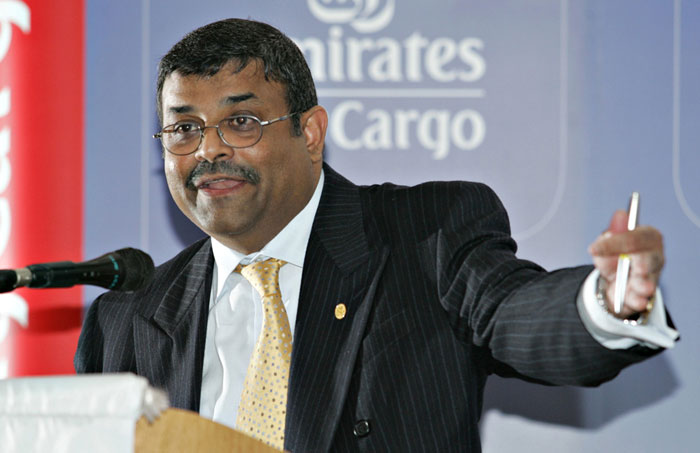
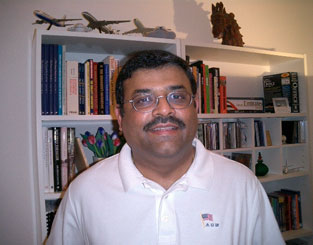 If
somebody at the other end of the phone advises packing a bathing suit,
Ram can only laugh.
If
somebody at the other end of the phone advises packing a bathing suit,
Ram can only laugh.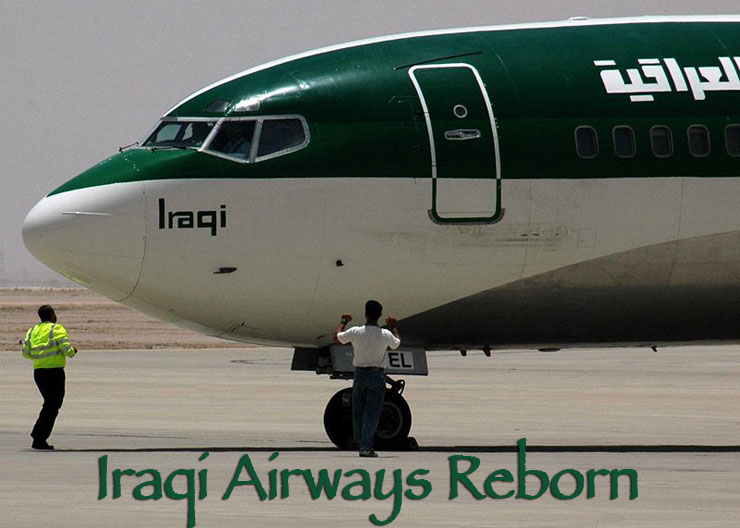
 The
reality here may prove a bit too optimistic in the short term.
The
reality here may prove a bit too optimistic in the short term. Air
Cargo News FlyingTypers leads the way again as the world’s first
air cargo publication to connect the industry to the broadly expanding
and interactive base for social commentary—Twitter.
Air
Cargo News FlyingTypers leads the way again as the world’s first
air cargo publication to connect the industry to the broadly expanding
and interactive base for social commentary—Twitter.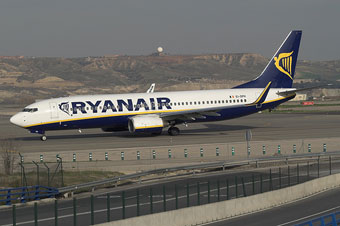
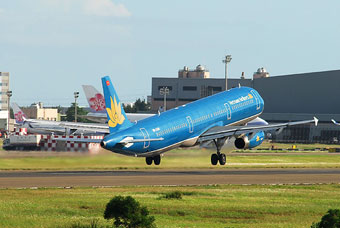
 September
8: Wings Club luncheon 11:45 Thurs. Sept
17 at Yale Club NYC powered by speaker David Hess, President Pratt &
Whitney. (212) 867-1770 or
September
8: Wings Club luncheon 11:45 Thurs. Sept
17 at Yale Club NYC powered by speaker David Hess, President Pratt &
Whitney. (212) 867-1770 or 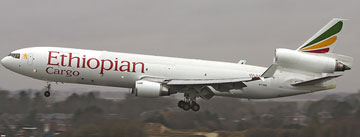 September 6: Ethiopian
Cargo gets 2nd MD-11F & 23% more lift. Ethiopian connects 19 cities
in Africa to int'l destinations with 2 B757F, 2 B747F, 2MD11F.
September 6: Ethiopian
Cargo gets 2nd MD-11F & 23% more lift. Ethiopian connects 19 cities
in Africa to int'l destinations with 2 B757F, 2 B747F, 2MD11F.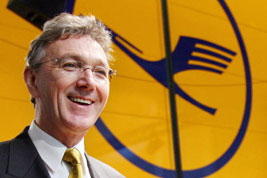 September
6: Quote To Remember—Lufthansa CEO
Wolfgang Mayrhuber at takeover ceremony of Austrian in Vienna tells
ATW: "Only profitable jobs are secure.”
September
6: Quote To Remember—Lufthansa CEO
Wolfgang Mayrhuber at takeover ceremony of Austrian in Vienna tells
ATW: "Only profitable jobs are secure.”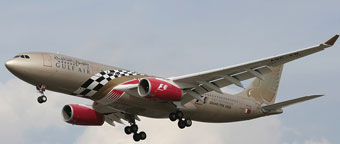
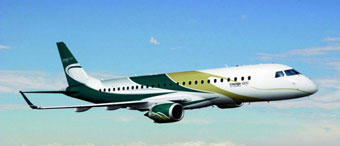
 September
5: Etihad Airways now flies Abu Dhabi/ Chicago
A346 thrice wk in addition to New York daily & thrice wk Toronto.
September
5: Etihad Airways now flies Abu Dhabi/ Chicago
A346 thrice wk in addition to New York daily & thrice wk Toronto.